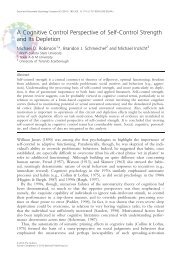Emotions and self-control 1 Incidental and Integral ... - Michael Inzlicht
Emotions and self-control 1 Incidental and Integral ... - Michael Inzlicht
Emotions and self-control 1 Incidental and Integral ... - Michael Inzlicht
You also want an ePaper? Increase the reach of your titles
YUMPU automatically turns print PDFs into web optimized ePapers that Google loves.
<strong>Emotions</strong> <strong>and</strong> <strong>self</strong>-<strong>control</strong> 30<br />
responding in favor of one course of action over another. When we face uncertainty about how to<br />
act because goals or response tendencies come into conflict with one another, we have an<br />
anxious affective response that directs us to resolve these conflicts by inhibiting ongoing<br />
behavior until we settle on a course of action (Gray & McNaughton, 2000).<br />
We have already mentioned that the affect alarm model is largely theoretical at this point,<br />
<strong>and</strong> thus somewhat preliminary. Nonetheless, the model makes a number of predictions that<br />
allow it to be distinguished from other theories, including predictions that have now been<br />
empirically supported. Space constraints prevent us from listing all predictions <strong>and</strong> empirical<br />
support, so we give only a small sample of them here.<br />
Given the importance of affect in alerting the need for <strong>control</strong>, the affect alarm model of<br />
<strong>control</strong> predicts that temporary increases in integral affect should enhance <strong>self</strong>-<strong>control</strong>. A recent<br />
study by Moser, Most, <strong>and</strong> Simons (2010) lends support to this view. When participants in this<br />
study “up-regulated” their negative emotions, they experienced both more negative affect <strong>and</strong><br />
improvements in <strong>control</strong>, suggesting that negative affect helps to enhance cognitive <strong>control</strong>.<br />
Negative affect is not enough, however; the affect alarm model suggests that people need<br />
to attribute their affect to the correct source; otherwise, negative affect will be unmoored from<br />
the instigating event (e.g., goal conflict) <strong>and</strong> will not appropriately alert people to the need for<br />
<strong>self</strong>-<strong>control</strong>. A recent study supports this view (<strong>Inzlicht</strong> & Al-Khindi, in press)—when people<br />
incorrectly attributed the natural, albeit mild anxiety produced by taking an executive <strong>control</strong>, the<br />
brain-signals related to performance monitoring ceased predicting cognitive <strong>control</strong>. Self-<strong>control</strong>,<br />
in other words, is thrown off course without negative affect acting as a guide.<br />
The affect alarm model of <strong>control</strong> further predicts that people who are attuned <strong>and</strong> aware<br />
of their own affective states will show enhanced <strong>self</strong>-<strong>control</strong>. Conversely, people who are



